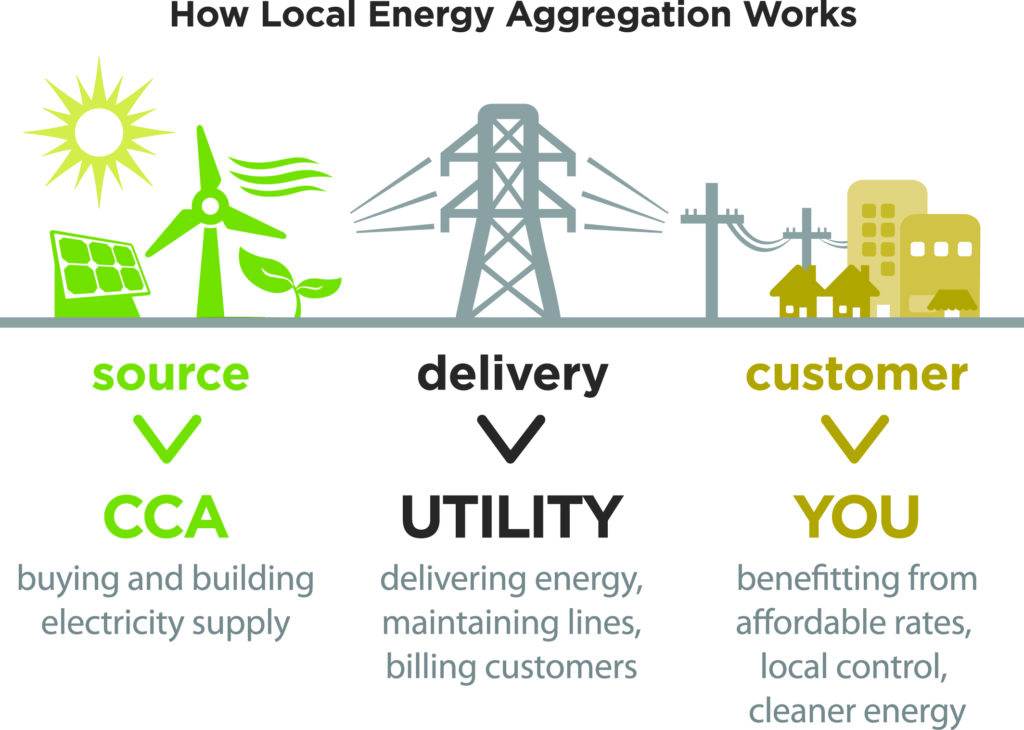How Cleaner Electricity
Comes to You
BY KIRSTEN ANDREWS-SCHWIND
“Iknew Community Choice Energy was a game changer,” says Shawn Marshall, shaking her head. “I did not understand how disruptive it would become.” As a city councilwoman in Mill Valley, Shawn helped launch California’s first Community Choice Energy program, in Marin County in 2010. “It was an anxious time. The powers that be said it couldn’t be done. Deep-pocketed PG&E threw everything at us, spending millions to publicly oppose Marin Clean Energy, while we continued to build it on a shoestring.”
As climate activists have long demanded, fighting climate change requires system change. To stop burning fossil fuels, humans need to quickly transform their energy use. But the entrenched interests of the fossil fuel industry frustrate transformation at every turn. Another challenge is the difficulty of getting busy people to change their behavior or take positive action. With Community Choice Energy, local governments are taking over energy supplies and cleaning them up at the needed systemic scale. Customers benefit without having to take action.
“I love that Marin Clean Energy met its goal for renewable energy from day one—then quickly exceeded it,” says Marshall. “The rapidity with which you can achieve greenhouse gas reductions is stunning. Now you can see how that scales up across California.”
Enabled by a California law written by Paul Fenn, Community Choice Energy allows local governments to offer their residents and businesses just that—choices—for their electricity supply. As a result, if you live in most parts of Humboldt, Mendocino, Sonoma, Marin, Napa, Yolo, Placer, San Francisco, Contra Costa, Alameda, San Mateo, Santa Clara, Santa Cruz, Monterey, San Benito, or Los Angeles County, or in the city of Lancaster or Benicia, you can congratulate yourself because you are already transforming your local energy system. Cities and counties in your area are working together to buy you cleaner energy while you go about your life.
From the customer point of view the transformation can be so effortless many don’t even notice. Residents and businesses receive at least four enrollment notices in the mail outlining their new choices for electricity supply. If customers take no action they are automatically signed up to have their electricity generated by their local Community Choice program. Their investor-owned utility, for example Pacific Gas and Electric, Southern California Edison, or San Diego Gas and Electric, continues to maintain the wires and poles that deliver electricity and sends one combined energy bill.

Public confusion can arise from a new line item on page one of the energy statement that may look like an extra charge but isn’t. The line that used to say just “electricity” is divided into two lines—electricity generation and electricity delivery charges. The electricity generation line item pays the Community Choice program for the electricity itself, while the delivery line item pays for infrastructure.
Community Choice programs set their prices to be competitive with those of the utility so customers get cleaner electricity with little to no impact on their wallets. Most programs are quickly phasing out fossil fuels much faster than the statewide goals required, often while offering customer savings as well. Most now offer the option to sign up for 100% renewable energy at minimal cost.
While Marin County paved the way for California’s energy transformation, the stress of trailblazing took a toll. Shawn Marshall’s mentor, County Supervisor Charles McGlashan, poured his passion into launching Marin Clean Energy but died from a heart attack a year later. “Charles was the ultimate visionary. To the extent that community choice has been a game changer you can trace it to him,” Shawn says. “I still feel him all the time telling me, ‘Keep going.’”
Shawn took that charge to heart and formed LEAN Energy, a consulting service to other local governments on how to start their own program. So far she’s helped launch seven other Community Choice programs. The path has not been easy. Utilities tried to weaken the model through legislation and even spent $46 million promoting a state ballot proposition to make implementing Community Choice more difficult. Climate activists organized groups such as the Local Clean Energy Alliance to successfully defend Community Choice from these attacks, even though they were outspent by nearly 500 to one.
Other communities looking into implementing Community Choice include San Luis Obispo, Santa Barbara, Riverside, and San Diego counties. Within a couple of years either a Community Choice program or an existing municipal utility will serve most of California’s major population centers. CalCCA tracks the movement’s statewide progress in terms of environmental, economic, and jobs creation benefits at CalCCA.org.
In keeping with their community roots, each program is designed by local elected officials to serve constituent priorities, often through innovation. Alameda County, for example, is exploring constructing more local wind and solar facilities to create jobs. In the North Bay, while rebuilding from the devastating fires, Sonoma Clean Power is supporting a pilot project to build neighborhood microgrids, as well as subsidizing electric car purchases. In Los Angeles County, Lancaster Clean Energy is innovatively contributing to a cleaner environment by helping support local electric bus service. It’s a terrific trend.
Kirsten Andrews-Schwind lives in San Mateo County and advocates for systems change to address climate change.